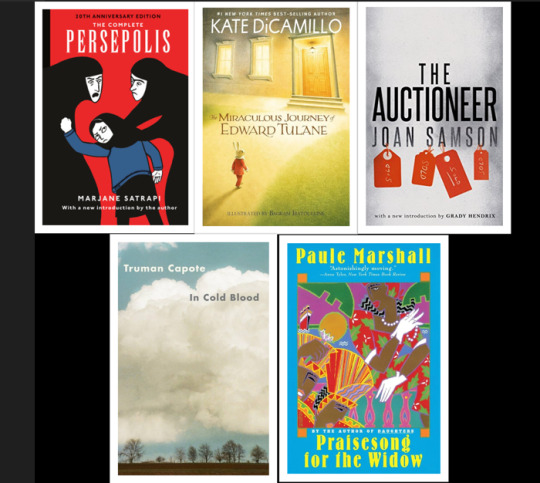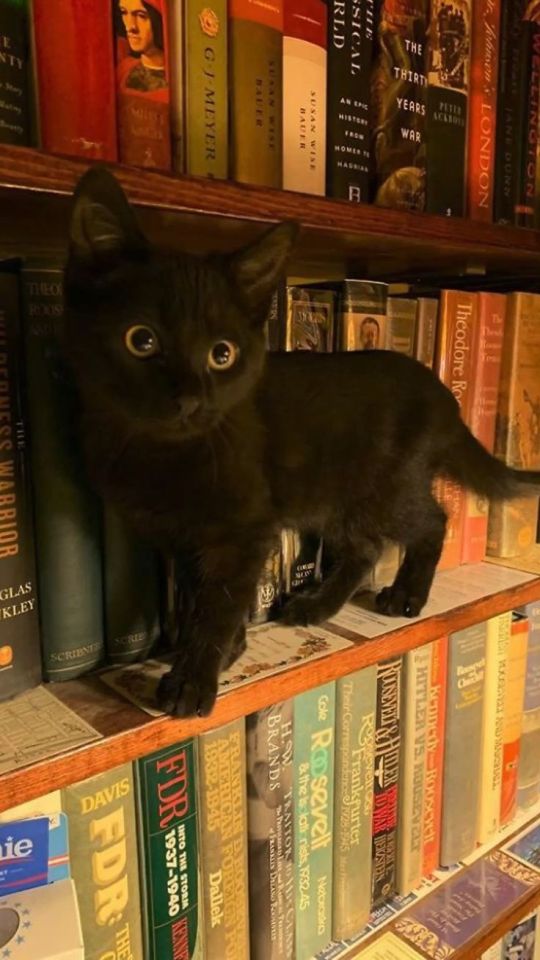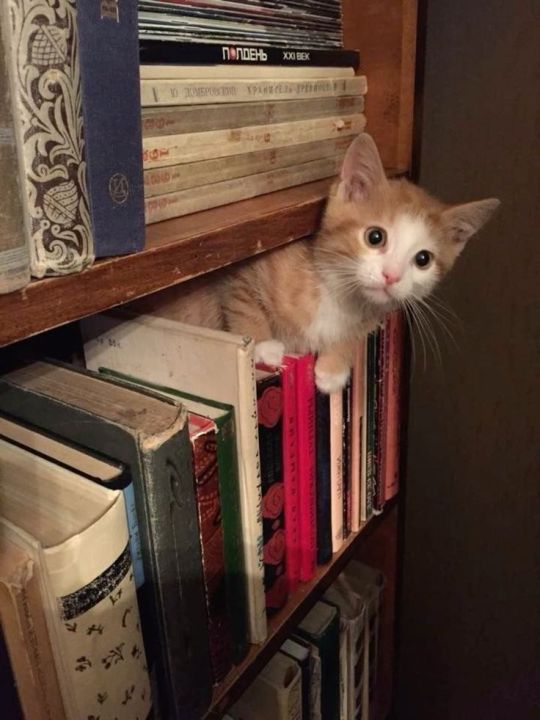Text
Thinking of the larger context of LOTR and like, the fellowship swapping old war stories and shit and Sam just says “Yeah I killed a huge spider…Shelob, I think?”
And Gandalf just blinks and is like, “You what now?”
“Yeah, killed it. Had to save Frodo”
Gandalf elects not to tell Sam that he killed the spawn of a primordial demon.
27K notes
·
View notes
Text
there's no greater betrayal than finally starting to read a book you've had sitting for months on your shelf or your desk or your nightstand and then finding out it's bad. like. i gave you a fucking home.
33K notes
·
View notes
Text
my favorite scene in LotR as a kid was when Sam started miserably freestyling in the tower of Cirith Ungol and the only reason he ever found Frodo was because he deliriously tried to join in
141K notes
·
View notes
Text
Many delightful and funny things about The Phantom of the Opera 1909 that never make it into adaption but my favorite is that the titular Phantom, famous and immediately identifiable by his passion for music, has for most of his life been employed-- very successfully!-- as an architect. It's canonically the only real job he's ever had.
50 notes
·
View notes
Text
It’s been two years since the great gatsby entered the public domain and Netflix hasn’t even made a horrible miniseries adaptation where they are all hot and gay and racially diverse but in a totally hollow meaningless unsexy way. We used to live in society
23K notes
·
View notes
Text
Not expalining WHY bookburning is bad and WHAT books were targeted has left us with Bookworm uwu girlies treating any art project or act involving destorying/modifying any random ass mass printed novel as if it was a crime against humanity
31K notes
·
View notes
Text
the best way i can think to describe the experience of reading moby dick is you’re in line at the dmv and this guy behind you very loudly says “well who HASN’T had a gay experience” and then proceeds to tell you every detail about his life in between anecdotes about how great sperm is and how ropes work and sometimes he’ll say the most poetic shit you’ve ever heard in your life and them jump RIGHT back into explaining how a whale is a fish because 1) it swims in water and you’re still only like halfway through the dmv line
140K notes
·
View notes
Text

I love Dolly, she has such a good heart.
144 notes
·
View notes
Text
“I’ve stolen a garden. It isn’t mine, it isn’t anybody’s. Nobody wants it, nobody cares for it, nobody ever goes into it. Perhaps everything is dead in it already, I don’t know. I don’t care, I don’t care. Nobody has any right to take it from me when I care about it and they don’t. They’re letting it die, all shut in by itsellf!”- The Secret Garden, Frances Hodgson Burnett
119 notes
·
View notes
Text
one thing I love about pride and prejudice is that wickham marrying lydia is never portrayed as a "well they deserve each other" situation. even while lydia is loud-mouthed and arrogant and conceited the book still makes clear that she's young and naive about wickham's intent and her running off to marry him is consistently portrayed from elizabeth's point of view as an awful thing. the "joy" and relief surrounding the confirmation of their marriage comes from the fact that it was the only way the situation could have ended in a way perceived as "respectable" and not because it was actually a good thing. for all of her flaws and negative character traits lydia is still a teenage girl being manipulated and groomed by a horrible worthless man and the book doesn't shy away from that. thank you miss austen
129 notes
·
View notes
Text
April 2024 Book Club

Persepolis by Marjane Satrapi: In 1979, Marjane Satrapi turned ten years old, living in Tehran. The same year, the Iranian revolution swept through the country, installing a new ultra-conservative government that clashed with Satrapi's loving, progressive family. As Satrapi chafed under the regime, her parents realized that the country was no longer safe for her and send her to Austria, where she must deal with the culture shock and the trauma of what she experienced on her own.
The Miraculous Journey of Edward Tulane by Kate DiCamillo: Edward Tulane is a china rabbit, of fine craftsmanship and quality, and he knows it. There's not much Edward loves than himself, not even his loving owner. But when Edward is separated from her during a family trip, he's taken on a whirlwind adventure to understand what love really means.
The Auctioneer by Joan Samson: Harlowe, New Hampshire is a town that seems forgotten by the ever-changing world around it, and its residents like that just fine. After all, the world outside Harlowe is dangerous and cruel. Not like the wholesome peace they have. So when a smooth-talking auctioneer named Perly Dinsmore proposes an auction to benefit the police force that keep Harlowe safe from that dangerous outside world, they're more than happy to contribute. But then Perly asks for more. Each week, Perly comes by again to solicit donations, and things slowly and insidiously begin to change. And when the citizens of Harlowe have nothing material left to give, Perly will find other things they can contribute. "Whatever I've done, you let me do."
In Cold Blood by Truman Capote: On November 15, 1959, in the small town of Holcomb, Kansas, four members of the Clutter family were savagely murdered by blasts from a shotgun held a few inches from their faces. There was no apparent motive for the crime, and there were almost no clues. Hundreds of miles away, recently paroled convicts Dick Hickock and Perry Smith made their way towards Mexico, certain that the terrible crime they committed would never be linked to them. As evidence comes to light and the police start closing in, Capote chronicles the details of the lives of the victims, their murderers, and their neighbors as the quintessential story of American violence unfolds and comes to a stormy head.
Praisesong for the Widow by Paula Marshall: In the dead of night Avey Johnson - a black, middle-aged widow given to hats, gloves, and pearls - leaves a cruise she was on with two friends, determined to get home again after a troubling dream. She's left her childhood of Harlem and Gullah songs behind her, and she longs to get back to the world that makes her feel secure. But when she disembarks on the island of Grenada, she finds herself swept up in a homecoming festival for the people of Curacao, where she will discover what coming home really means.
#book club#april 2024#persepolis#marjane satrapi#the miraculous journey of edward tulane#kate dicamillo#the auctioneer#joan samson#in cold blood#truman capote#praisesong for the widow#paula marshall
0 notes
Text
Very hypocritical of me to continue posting about a hypothetical despised modern adaption but imagine being Christine and learning the homeless guy living under the opera house you've been leaving out granola bars for, your mysterious Zoom-exclusive vocal coach, and the fugitive wanted for a number of international murders are the SAME GUY
90 notes
·
View notes
Text
emma woodhouse is the funniest jane austen heroine solely because she spends 95% of her precious free time shipping her friends and trying to set them up and being convinced she is the world's greatest matchmaker and talking about how great it will be once her bestie has her perfect true love and then when she's asked if she's considering getting married anytime soon she's like pfffft GOD no why the FUCK would i do that
4K notes
·
View notes
Text
It's kind of fascinating to me that towards the end of P&P, Elizabeth has become protective of Darcy and either a) actively tries to insulate him from Situations or b) wishes that she could and gets stressed that she can't.
Darcy deeply loves her and is very ready to do whatever he can to secure her happiness, but narratively, I think the emphasis at the end is very much more on Elizabeth's protectiveness towards him.
It's like:
When Bingley and Darcy first come back to Hertfordshire, Darcy is very quiet and Elizabeth can barely bring herself to say anything—until Mrs Bennet insults Darcy. Then Elizabeth speaks up.
Mrs Bennet enlists Elizabeth to separate Darcy from Bingley with another insult to Darcy. Elizabeth finds this both convenient and enraging.
That day, Elizabeth decides to privately tell Mrs Bennet about her engagement to Darcy, specifically so that Darcy will be spared Mrs Bennet's first unfiltered response.
Elizabeth fiercely defends Darcy's character and love for her, as well as hers for him, to Mr Bennet. She not only says she loves Darcy but that it upsets her to hear Mr Bennet's criticisms of him.
Elizabeth is both relieved by Mrs Bennet's ecstatic reception of the engagement and a bit disappointed by how completely shallow she's being about it, and 100% sure she made the right call in keeping Darcy away.
Elizabeth defends Darcy against Darcy himself, repeatedly.
There's a period where Elizabeth seems to unwind and laugh, but this passes, especially after Charlotte and Mr Collins show up. Darcy manages to stay calm around Mr Collins (I think this is framed as a significant and admirable achievement for him), but Elizabeth does not like him being in a situation where he has to deal with Mr Collins in the first place.
Elizabeth tries to shield Darcy from being noticed by Mrs Phillips and Mrs Bennet, who do seem to make him pretty excruciatingly uncomfortable.
Ultimately, Elizabeth ends up trying to keep Darcy to herself or to shepherd him around to relatives he can handle more easily, and is so stressed at this point that she just wants to get married and escape to Pemberley.
After their marriage, things are actually great at Pemberley and in their married life, despite the occasional complication.
Lydia writes a congratulatory letter to Elizabeth, asking for Darcy to get Wickham a promotion unless Elizabeth would rather not bring it up with him. Elizabeth really does not want Darcy to have to deal with this and handles it by privately setting aside a Lydia fund out of her personal expenses. (IIRC, it's not clear if Darcy even knows about this.)
Elizabeth also is the driving force behind Darcy's reconciliation with Lady Catherine.
This could read as an unsettling, unbalanced dynamic and a very odd ending point for the arc of a woman like Elizabeth, but in the context of the overall novel, it doesn't feel that way. Or maybe I'd see it more that way if I interpreted Darcy (and for that matter, Elizabeth) + their arcs differently? But as it is, I do think that by this point in the story they are genuinely doing the best they can, independently and for each other, and they've both come a long way. They shine in different contexts and support each other as much as they can in the circumstances that do arise.
It seems very them, in terms of their temperament and abilities, that Elizabeth would put all this effort into shielding Darcy, while at the same time, Darcy completely cuts off Lady Catherine for insulting Elizabeth and only ever speaks to her again because Elizabeth wants him to.
170 notes
·
View notes





